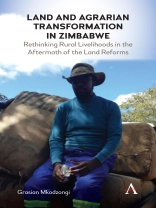This book examines the dynamics underpinning the implementation of Zimbabwe’s fast track land reforms. By utilising ethnographic data gathered in central Zimbabwe, the book goes beyond the polarised debates which dominated scholarship in the earlier period to highlight the changing livelihoods occasioned by the land reform. The book argues that despite the challenges faced by the newly resettled farmers, the land reform has allowed landless and land-short peasants access to land and other natural resources which were previously enclosed to them under a bi-modal agrarian structure inherited from colonialism.
Table of Content
Abbreviations; Chapter One: Introduction: An Overview of Zimbabwe’s Land Reform Program, 2000–2020; Chapter Two: Reclaiming the land in Mhondoro Ngezi; Chapter Three: Land beneficiaries and their origins; Chapter Four: Governing the land after the land reform; Chapter six: ‘Turning Strangers into Neighbours’: Social organisation and agency after the land reforms; Chapter Seven: Conclusions; Bibliography; Archival files; Newspaper articles; List of interviews; List of meetings; Index.
About the author
Grasian Mkodzongi is an executive director at the Tropical Africa – Land and Natural Resources Research Institute (Tropical Africa LNRRI) based in Harare, Zimbabwe.












